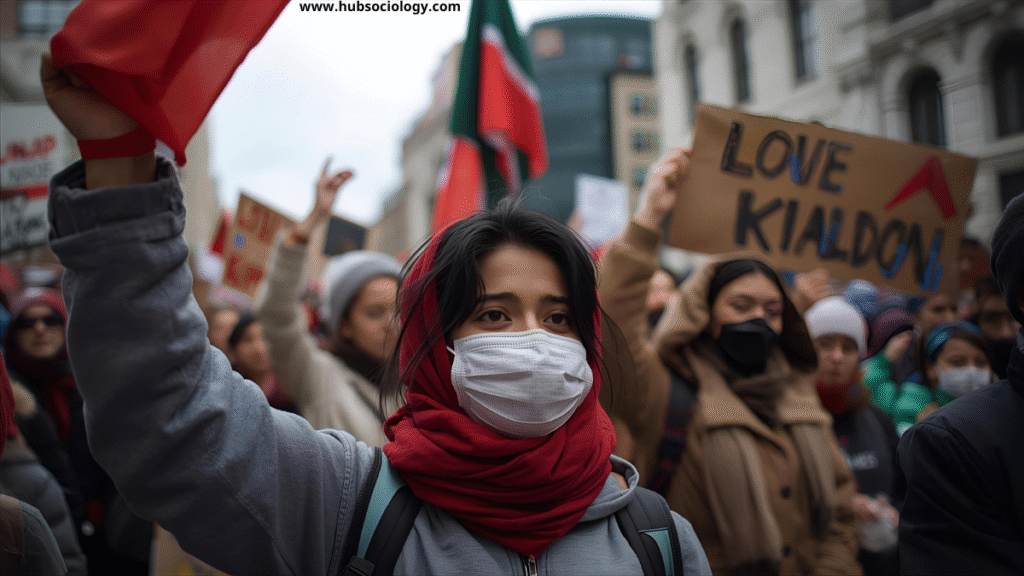Introduction
In the contemporary era, social movements are not confined within the boundaries of nation-states but are deeply intertwined with the processes of globalization. Globalization, which refers to the intensification of worldwide social relations linking distant localities, has brought about profound changes in the way societies operate, communicate, and mobilize. From environmental movements to feminist struggles, from anti-globalization protests to digital rights campaigns, the global stage has become both a challenge and an opportunity for collective action.
From a sociological standpoint, the relationship between social movements and globalization can be seen as dialectical. On one hand, globalization creates conditions of inequality, exploitation, and cultural homogenization that stimulate resistance. On the other hand, it provides new channels of solidarity, transnational networks, and resources that empower movements. This article analyzes the impact of globalization on social movements within a sociological framework, drawing from theories of collective action, world-systems theory, and cultural globalization.

Social Movements: A Sociological Understanding
Social movements are collective, organized efforts by groups of people to promote or resist change in society. They are often rooted in grievances, identity politics, or broader struggles for justice. Charles Tilly defined social movements as “sustained interactions between power holders and people who claim to speak for a constituency lacking formal representation.”
Traditionally, social movements operated within national contexts, addressing issues such as workers’ rights, civil liberties, or gender equality. However, the forces of globalization have shifted the terrain of struggle. Today’s movements often transcend national borders, engaging with issues like climate change, global capitalism, digital surveillance, and migration.
Globalization: Defining the Context
Globalization is not merely an economic phenomenon; it encompasses cultural, political, technological, and environmental dimensions. Anthony Giddens describes globalization as the “intensification of worldwide social relations which link distant localities in such a way that local happenings are shaped by events occurring many miles away and vice versa.”
Key features of globalization that affect social movements include:
- Economic restructuring: Expansion of global capitalism, privatization, and neoliberal reforms.
- Cultural flows: Spread of media, consumer culture, and hybrid identities.
- Political transformations: Weakening of the nation-state and rise of supranational institutions like WTO, IMF, and UN.
- Technological innovation: Internet, social media, and digital platforms enabling real-time communication.
- Environmental interdependence: Global ecological crises that demand collective action.

Impact of Globalization on Social Movements
1. Emergence of Transnational Movements
Globalization has given birth to movements that are no longer confined to one country. For instance, the environmental movement against climate change has global solidarity with organizations like Greenpeace, Fridays for Future, and Extinction Rebellion. Similarly, women’s movements are increasingly transnational, connecting feminist groups from the Global South and North to resist gender-based violence and economic exploitation.
2. Anti-Globalization and Alter-Globalization Protests
Ironically, globalization has produced resistance against itself. The anti-globalization movement, visible in protests against the WTO meetings in Seattle (1999), represents a collective critique of neoliberal policies, labor exploitation, and environmental destruction. Alter-globalization groups argue for a “different globalization” based on equity, human rights, and ecological balance rather than corporate profit.
3. Digitalization and Social Media Mobilization
Globalization, particularly through technological advancements, has transformed the way movements are organized. Social media platforms such as Twitter, Facebook, and Instagram have enabled activists to bypass traditional media, coordinate protests, and build solidarity across borders. Movements like the Arab Spring, #MeToo, and Black Lives Matter gained momentum because digital globalization amplified their messages worldwide.
4. Hybrid Identities and Cultural Resistance
Globalization spreads dominant Western cultural values through media and consumer products, which often leads to cultural homogenization. In response, social movements frequently assert local identities, indigenous traditions, and cultural autonomy. For example, indigenous rights movements in Latin America not only resist economic exploitation but also defend their cultural heritage against global homogenization.
5. Global Inequality and Class Struggles
Globalization has deepened inequalities between the Global North and South, and between elites and marginalized groups within countries. This inequality fuels movements for economic justice, fair trade, and workers’ rights. Migrant labor struggles, sweatshop protests, and campaigns for living wages highlight how global economic restructuring creates new forms of exploitation that movements resist.
6. Networking and Solidarity Across Borders
One of the positive impacts of globalization is the possibility of creating transnational networks of solidarity. Movements now share resources, strategies, and experiences through international NGOs, online platforms, and global forums such as the World Social Forum. This interconnectedness empowers local movements by situating them within a global framework of resistance.
7. Challenges of Co-optation and Fragmentation
While globalization strengthens some movements, it also fragments others. The dominance of Western NGOs in transnational activism can marginalize local voices. Moreover, movements risk being co-opted by global institutions or diluted by donor-driven agendas. This reflects a tension between global visibility and local autonomy.
Sociological Theories and Perspectives

- World-Systems Theory (Immanuel Wallerstein)
This perspective views globalization as part of a capitalist world economy where core countries dominate the periphery. Social movements in the periphery, such as peasant uprisings or anti-imperialist struggles, can be seen as responses to systemic exploitation. - Resource Mobilization Theory
Globalization provides movements with new resources, including international funding, digital tools, and global media attention. However, access to these resources is uneven, creating hierarchies even within global movements. - New Social Movements Theory
Unlike classical class-based movements, new social movements (e.g., environmental, feminist, LGBTQ+) focus on identity, culture, and lifestyle. Globalization intensifies these struggles by making them visible worldwide, but also challenges them with cultural homogenization. - Cultural Globalization and Resistance
From a sociological lens, globalization produces hybrid cultures, but also provokes resistance. Movements often reclaim cultural symbols, traditions, and languages as acts of defiance against cultural imperialism.
Case Studies
- Arab Spring (2010–2012): Mobilized through social media, it shows how digital globalization empowers political uprisings.
- Fridays for Future: Greta Thunberg’s climate strike movement became a global phenomenon, transcending national boundaries.
- Zapatista Movement (Mexico): Resisting neoliberal policies and defending indigenous rights, the Zapatistas gained international solidarity through digital networks.
- #MeToo Movement: Highlighted gender-based violence globally, demonstrating how cultural issues gain transnational traction.
Conclusion
Social movements in the age of globalization represent a complex interplay of resistance and adaptation. On the one hand, globalization intensifies inequality, exploitation, and cultural erosion, providing fertile ground for mobilization. On the other hand, it offers tools, networks, and global platforms that amplify voices of resistance.
From a sociological perspective, globalization has transformed not only the scope and strategies of social movements but also their very identities. Movements are no longer limited to local grievances; they are embedded in a global web of struggles for justice, democracy, and sustainability.
Ultimately, the dialectical relationship between globalization and social movements reveals the potential for collective action to reshape global society. While globalization may pose challenges, it also holds the promise of creating a more interconnected, just, and equitable world—if social movements can harness its transformative power.
Do you like this this Article ? You Can follow as on :-
Facebook – https://www.facebook.com/hubsociology
Whatsapp Channel – https://whatsapp.com/channel/0029Vb6D8vGKWEKpJpu5QP0O
Gmail – hubsociology@gmail.com
Topic Related Questions
5 Marks Questions
- Define social movements from a sociological perspective.
- What is meant by globalization in sociology?
- Mention two impacts of globalization on social movements.
- Give examples of two transnational social movements.
- How does social media influence social movements in the era of globalization?
10 Marks Questions
- Explain the relationship between globalization and the emergence of new social movements.
- Discuss the role of digital platforms in shaping global social movements.
- How does globalization contribute to the growth of anti-globalization movements?
- Examine the sociological significance of transnational solidarity in social movements.
- Analyze the impact of globalization on identity-based social movements.
15 Marks Questions
- Critically evaluate the positive and negative impacts of globalization on social movements.
- Discuss the role of world-systems theory in understanding globalization and social movements.
- How has globalization transformed the strategies, scope, and identities of social movements?
- With suitable examples, explain how globalization has both empowered and fragmented social movements.
- Assess the dialectical relationship between globalization and social movements in the 21st century.

1 thought on “Social Movements and Impact of Globalization: A Sociological Perspective”